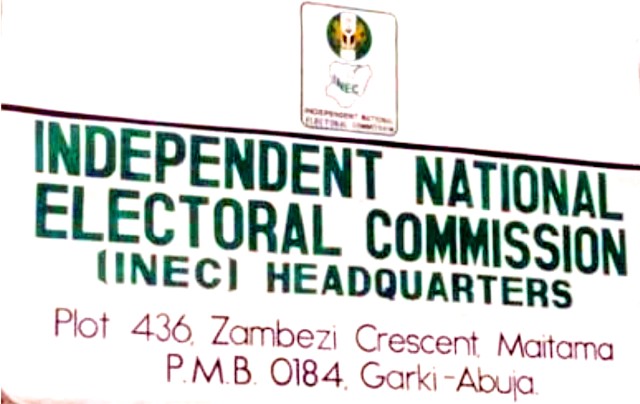Editorial
2019: The Task Before INEC

The Independent National Electoral Commission (INEC), penultimate week, announced a timetable for the 2019 general elections in Nigeria.
According to a statement issued by its National Commissioner in charge of the South West, Prince Solomon Soyebi, the 2019 presidential and National Assembly elections have been scheduled to hold on February 16, 2019. It also added that the gubernatorial, State Assembly and Federal Capital Territory Area Council polls will be conducted on March 2, 2019.
According to the Commission, it resolved to release the timetable early enough to ensure certainty of dates and allow for proper planning by all stakeholders.
With these dates, and barring any eventual alterations, it means that only about 23 months stand between now and the commencement of the 2019 general elections. The constitution provides for election to hold not earlier than 150 days and not later than 30 days to the end of an incumbent’s tenure.
Having examined the reasons adduced by INEC for the early release of the election timetable, we are a little disturbed by the huge task ahead of the nation’s electoral umpire. While we may not question the Commission’s constitutional responsibilities, we, however, think that the announcement which is capable of causing a distraction to political office holders, should rather serve as a wake-up call to all politicians, political parties, security agencies and other participants in the nation’s electoral process.
The Tide thinks that INEC should first undertake a self-cleansing by putting its house in order to avoid a repeat of the anomalies that were associated with recent elections in the country, especially in Rivers, Bayelsa and Edo States, among others.
We note that about 30 out of the 36 states in the country are without Resident Electoral Commissioners (RECs) and other critical staff for smooth conduct of any general elections. INEC should address this absurdity and also consider doing the needful in the following areas: revision of voters register; card reader upgrade; delineation of electoral constituencies; voter education and sensitisation; logistics planning, among others.
Again, the Commission needs to quickly consider the registration of new political parties from among the 83 political associations that have already applied. It must also acquit itself of the partisanship that has continued to be levelled against it by some stakeholders.
As a truly independent body, INEC must never go begging cap-in-hand for funds from the Presidency or any other source for that matter. It must remain as an unbiased umpire and not submit to the whims and caprices of any individual or political party in the discharge of its statutory duties. The use of private property as voting centres is an absurdity the Commission must hasten to jettison before the 2019 elections. Indeed, Nigeria’s electoral precincts are still dotted with royal courts, worship centres, private schools, hotels and residences of party bigwigs which have continued to serve as polling booths on election days. This is obviously unacceptable and must be rectified.
There may also be the need to review the Electoral Act in order to properly define the role of security agencies during elections. The massive deployment of military and paramilitary personnel to election venues is something that has come under criticism across the country as an intimidation ploy against the opposition parties.
The Commission must also reassure organizations like the National Youth Service Corps (NYSC) of the safety of its members who constitute the bulk of its ad hoc staff during elections. This is important in view of the reluctance of the Corps to release its members for election duties, especially in areas presumed to be highly volatile.
Two years may appear to be enough time for the accomplishment of the aforementioned tasks, but we fear that, for INEC, 2019 will most likely arrive earlier than expected if the electoral body does not hit the ground running immediately. Going by the economic realities in the country, Nigerians are unlikely to accept any failure arising from inconclusive elections and court-ordered reruns that may cost the country extra expenses.
Let us, therefore, hope that the incumbent chairman, Prof. Mahmoud Yakubu and his commissioners are not only listening but poised to perform better. In fact, The Tide expects that the forthcoming governorship elections in Anambra and Ekiti States would serve to better position INEC for an impressive outing in 2019.
Editorial
Sustaining OBALGA’s Ban On Street Trading

Editorial
AFCON ’25: Bravo, Super Eagles, But…

Editorial
Fubara: Celebrating A Leader At 51

-

 Sports19 hours ago
Sports19 hours agoArsenal Women End Man City’s Invincibility
-

 Environment18 hours ago
Environment18 hours agoRivers State Government Suspend Fire Service Collection Levies
-

 Sports19 hours ago
Sports19 hours agoU-20 WWC: Falconets claim qualifier win
-

 Politics20 hours ago
Politics20 hours agoI DEFECTED OUT OF CONVICTION …NO ONE COULD’VE IMPEACHED MY LATE DEPUTY ~ DIRI
-

 Environment18 hours ago
Environment18 hours agoLASEMA pushes attitudinal change to cut fire outbreaks in Lagos
-

 Maritime22 hours ago
Maritime22 hours agoOver 6,223 Seafarers Abandoned In 2025 – Says ITF
-

 Sports19 hours ago
Sports19 hours agoInsurance Deepen Enyimba’s Trouble
-

 Maritime21 hours ago
Maritime21 hours agoCustoms Hands Over Seized Cannabis Worths N4.7bn To NDLEA

